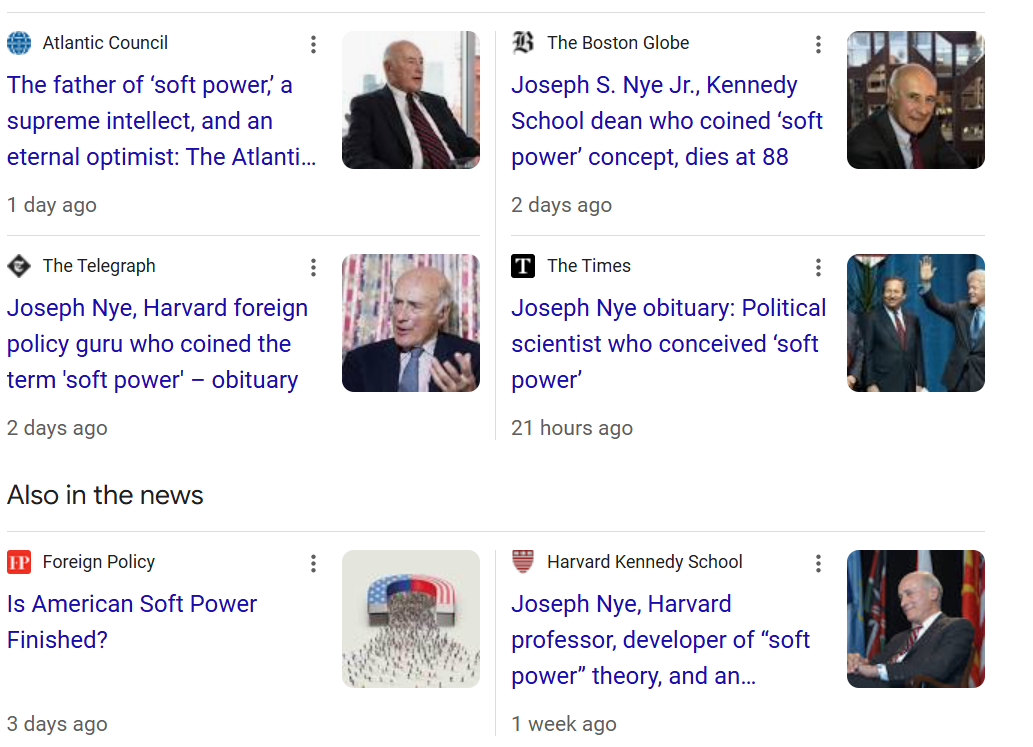Renowned international relations scholar and practitioner Joseph S. Nye passed away last week. Numerous tributes have been written, noting his high quality scholarship and influence on US foreign policy. While most have discussed his major idea–soft power–I’d encourage today’s IR scholars to look into his work on complex interdependence as well.
Soft power and Nye’s legacy
Many have noted his specific contributions to our understanding of international relations, the idea of soft power. Indeed, this dominated discussion of his legacy.

The focus on soft power is valid. Nye developed this idea at the perfect moment, as the world was emerging from the Cold War and looking for a hopeful alternative to great power competition. He adapted it to enduring military challenges, coming up with variants such as “smart power.” It was a powerful idea because it both seemed obvious–the attractive power of our culture and values can be just as significant as our military might–and innovative, by giving proponents of non-military instruments of statecraft a new language to use.
The idea of soft power has dominated discussion of Nye’s legacy.
I certainly agree it’s important. I’ve written on religious soft power–both how to study it and examples in US foreign policy–and my latest book could be argued to demonstrate the impact of religion as a soft power tool. I have critiqued soft power, but mainly in the loose way scholars and policymakers use the term rather than the term itself.
Power and interdependence
But “soft power” wasn’t Nye’s only contribution to our understanding of international relations. A few decades before his work on soft power, Nye wrote Power and Interdependence with Robert Keohane. This book, and accompanying articles, questioned the realist paradigm that then dominated the study of international relations, arguing that growing complex interdependence among states was transforming their behavior. This led to the emergence of multiple channels connecting states–not all of them official–a lessened hierarchy of issues for policymakers, and decrease in the utility of military force.
I first encountered this concept when I was an undergrad, conducting initial research for my senior thesis on nuclear proliferation (my academic career went in a different direction). I found it incredibly compelling, as it was much richer than the Waltzian realism I’d encountered but didn’t rely on overly-idealistic assumptions about human behavior. It actually allowed for analysis of tensions among states, and was a useful framework for my thesis.
We should be sure to remember Power and interdependence when discussing Nye’s legacy.
It certainly has had an impact when measured quantitatively. The book isn’t coming up on Google Scholar. But their 1972 article in Survival presenting the idea has 18,100 citations. A follow-up article a decade later has 1,305, and a 1990s update has 1,800.
But it doesn’t compare to his work on soft power. Nye’s original 1990 “Soft Power” article has 7,300 citations, although his 2004 book has 20,400. And there’s another 15,000 or so in other works by Nye on soft power.
The enduring importance of Power and Interdependence
I’m not really sure why soft power became the idea for Nye (although I’d love to be in a situation where my second most influential idea has 20,000 cites). Maybe it was timing–1970s-era optimism ran up against the heightened Cold War of the early 1980s. Maybe it was intellectual; Power and Interdependence helped inspire neoliberalism in international relations, but neoliberalism kind of left its rich foundations behind. I had no idea until I got to grad school that this book was considered “out of date.”
Whatever the reason, we should be sure to remember Power and interdependence when discussing Nye’s legacy. Intellectually, Keohane and Nye foreshadowed both neoliberalism and constructivism, while also setting the stage for the post-paradigmatic work on international security not wedded to neorealism’s strict constraints. Policy-wise, we aren’t living in the utopia promised by early liberal scholars, but part of the reasons current conflicts are so concerning and complicated is that they are occurring in the context of complex interdependence among states. Reviving their insights and applying them to today’s events could be of great use.


Hi Peter, I appreciated the post. It motivated some thoughts of my own.
https://bespokehumancontent.substack.com/p/after-hegemony-ii-complex-interdependence